Franciszek Józef is still remembered with sentiment today. Compared to other rulers of the partitioning states, it may actually be better. But did he really deserve such a good reputation? Maybe he just ruled so long that Polish subjects fell in love with him ... out of habit?
Contrary to appearances, the rulers of the partitioning states enjoyed loyalty from many of their Polish subjects. To this day, however, the sentiment towards only one of them survives - Franciszek Józef ruling from the end of 1848.
The beginnings of the Austrian emperor's rule did not bode well for the Polish cause. At the very beginning he dealt bloodily with the Hungarian uprising , in which many Poles, including General Józef Bem, were also involved. Moreover, the repressions also affected Polish activists of the Spring of Nations. They were forcibly drafted into the army, placed under police surveillance or imprisoned.
Soon, however, the first glimmer of hope appeared that Franz Joseph would turn out to be different from the rest of the rulers of the partitioning powers. Its softer side was shown, for example, by the story of Count Adam Potocki, arrested in the aftermath of the Spring of Nations. As his six-year sentence in the fortress was read, he stood to attention and exclaimed, "Es lebe der Kaiser!" (Long live the emperor!). This gesture struck the monarch in such a way that the condemned man was pardoned.
Time for autonomy
Hopes for the improvement of the situation of Poles really came true under the rule of a long-lived ruler. This was partly due to events in the international arena. Paradoxically, it was the military disasters suffered by Austria that benefited the inhabitants of the Habsburg monarchy. After the unsuccessful Italian campaign in 1859 and the lost war with Prussia in 1866, the authorities in Vienna realized that changes were necessary. It was recognized that in order for the state to survive, it must be rebuilt in a federal spirit.
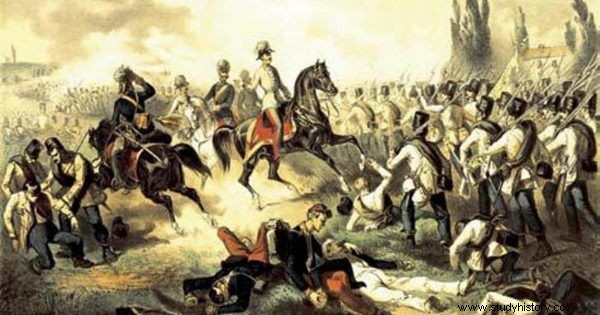
Franz Josef I at the head of his troops during the Battle of Solferino in 1859. Military defeats led to the fact that the young ruler decided to reformulate the internal structure of the state. For the benefit of, among others, Poles.
Thanks to this, Galicia gained autonomy as early as 1861. Although the region was described in Austrian press reports as "a picturesque country, but poor and even wild", it was granted quite a lot of freedom. As he writes in the book "Habsburg Empire. Commonwealth of Nations ”Pieter M. Judson:
There was no formal arrangement, but the Austrian government allowed the complete Polonization of the national administration and the restoration of the Polish language in Germanized higher education. A special "Minister of Galicia" was also appointed in all subsequent cabinets.
Therefore conservative Polish politicians, starting in the 1970s, generally supported all Austrian governments and these, in return, left them a free hand in the internal affairs of the crown country. This was the case until the turn of the century, when the growing popular and Ukrainian movements threatened the supremacy of a narrow circle in power.
Galicia also gained considerable autonomy in matters of social policy and education at lower levels. Thus, Poles achieved more in terms of independence than, for example, the Czechs. Of all the peoples of the empire, we are the closest to the status of an independent Hungary.
Mission of the monarchy
The change in the political situation also led the Habsburgs to perceive their role in Europe a little differently. This is how the process was described by Judson in The Habsburg Empire:
Having lost its traditional dominance in Germany in 1866, the liberal monarchy sought a new mission in Europe. In the seventies, it was cultural diversity that seemed to be a good field for the Habsburgs' civilization mission, extremely suitable for eastern and south-eastern Europe (...). In the first place, the energy was directed to Galicia and Bukovina, lying within the state.
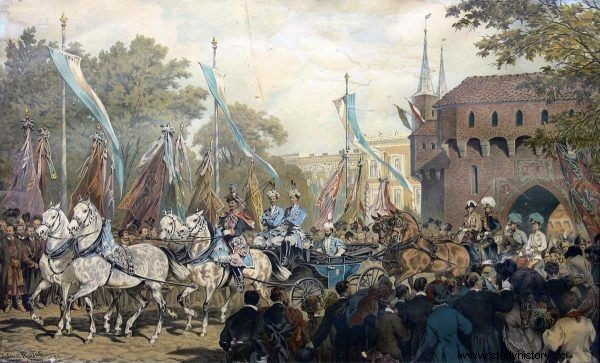
Entry of Emperor Franz Joseph I to Krakow in 1880 in a painting by Juliusz Kossak.
We did not have to wait long for the effects of the increased interest in regions so far neglected. You can see them, for example, in the development of education. At the beginning of the 20th century, the level of literacy in Galicia began to approach that of urbanized Bohemia. The distance between the parts of the empire slowly decreased. In 1910, 58 percent of people over the age of eleven could read and write in Galicia. It was still less than in the Austrian half of the monarchy, where the figure was as high as 83.5 percent, but for the region this was a significant improvement. Thirty years earlier, only 14 percent were readers and literate people.
At the Imperial Court
Polish politicians also became gradually more active. With time, they began to play an increasingly important role in the imperial court. In 1870, Count Alfred Potocki was awarded the portfolio of the Prime Minister. Thanks to him, it was possible to introduce Polish as a teaching language at the University of Krakow (with the exception of German literature). Kazimierz Badeni was also the Polish prime minister in the years 1895–1897. As professor Waldemar Łazuga lists:
A total of sixteen Poles sat in Austrian cabinets [...], including three prime ministers (simultaneously holding ministerial functions), seven heads of treasury, four ministers of religion and education, one minister of railways , one joint treasury minister and one joint foreign minister.
So the Poles were doing quite well. It must be admitted, however, that it was not the result of any particular sympathy of the emperor . The system he created was fruitful. It was thanks to him that Poles could influence the fate of the country. After all, the Habsburg monarchy was to be the homeland of all Austro-Hungarian nations, regardless of language or religion.
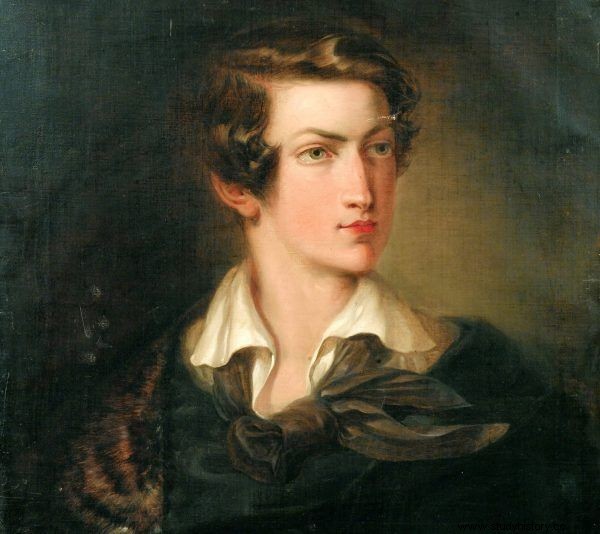
Alfred Potocki, one of the three Polish prime ministers in the painting by Jakub Prociński.
The Habsburg king of Poland?
It can be suspected that Franz Józef had even more far-reaching plans for Poland. If he had not run out of time, he could have contributed even more to the Polish cause, restoring the state - of course limited - independence within the empire. Russia was already afraid of this around 1880. Carscy agents, collecting information about the planned visit of the emperor to Krakow, suspected that the local Poles would want to raise toasts to Franz Joseph as the "king of Poland". The real chance for changes in this matter, however, came only at the end of the emperor's life. This is what he wrote about his plans in a document dated November 4, 1916:
It is [...] my will [...] to grant the country of Galicia the right to arrange its domestic affairs independently, up to the full measure of its belonging to the whole country and its prosperity he agrees, and thus guarantees Galicia's national and economic development.
Unfortunately, the idea of giving Galicia full independence remained only in the sphere of plans. The emperor did not manage to realize it. He died several days later.
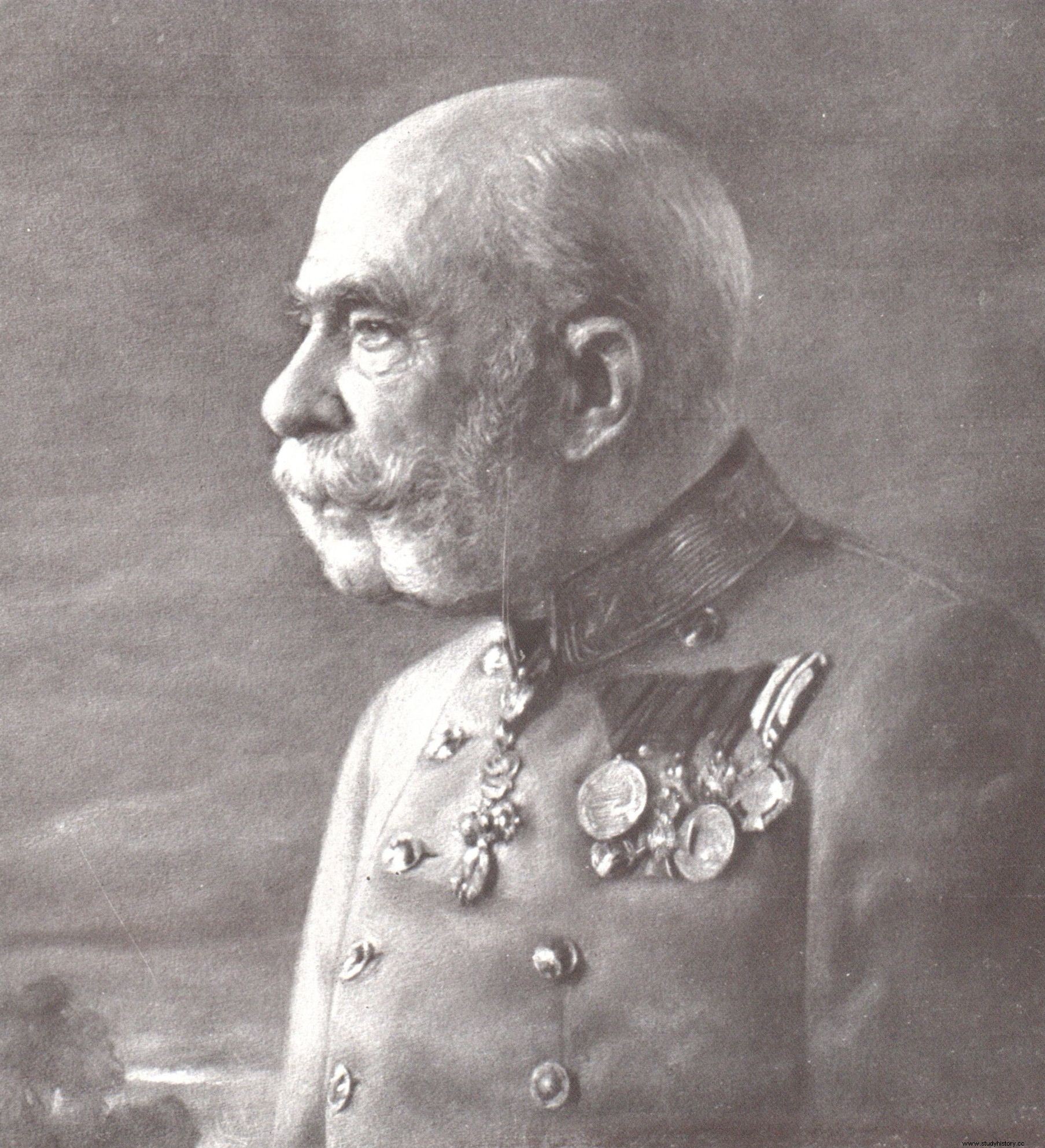
One of the last photos of the Emperor of Austria, King of Hungary (and would-be king of Poland?) Franz Joseph I. The author of the photo was Carl Pietzner.
A product of propaganda
However, the greatest role in shaping the grateful memory of Emperor Franz Joseph was not his specific moves, but ... propaganda activities. One could read about the ideal of the reigning monarch in official journals, newspapers and readings. Such an excerpt was found, for example, in a Galician school textbook from 1888:
If today every citizen of the country enjoys equally well-thought-out laws, if agriculture is flourishing, trade is growing, and industry is growing stronger:this should be attributed to wise and just action monarch who took the good of his nations as the main task of his life.
The image of the emperor was also warmed by the fact that he remained "close to people". He was often seen live. He visited various lands of his vast monarchy. In 1880 he was greeted with great enthusiasm in Krakow. It was also possible to apply for an audience in Vienna. The brightest gentleman saw the petitioners almost every day, so there was a good chance to stand face to face with him.
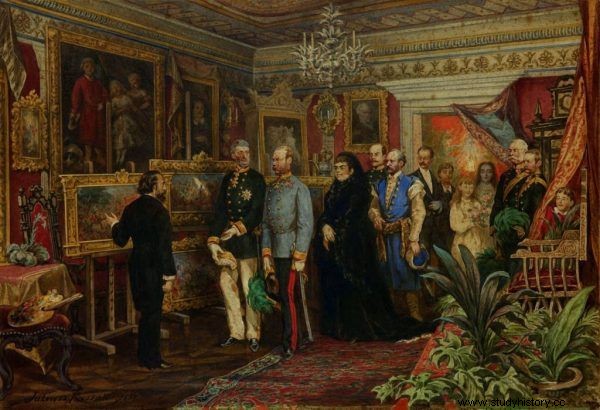
The ruler could be met not only during his stays in Galicia, but also at daily audiences in Vienna. A painting by Juliusz Kossak, entitled "The visit of Emperor Franz Joseph in the house of Jan Matejko" from 1881.
***
Franz Joseph ruled from 1848 to 1916. Many people living at the turn of the nineteenth and twentieth centuries did not know another monarch - this one ruled "always" . His death coincided with enormous changes for his subjects. It was then that they felt the full effects of the ongoing world war. Hunger knocked on their homes. The Spanish woman also took a huge toll.
For those who witnessed the collapse of the Habsburg monarchy and fierce fighting over its ruins, the late emperor became a symbol of "good Austrian times". The quiet, bloodless years of his reign were fondly remembered. It certainly contributed to the building of the legend of Franz Joseph, perhaps even more than specific political activities. Therefore, when writing about the Serene Lord, a historian often has less to say than a cultural anthropologist or an ethnographer. Because a large part of the sentiment to "our Cysorz" in some way belongs more to the sphere of myth than historical facts.
